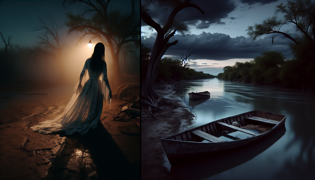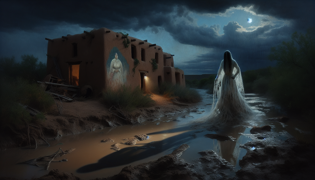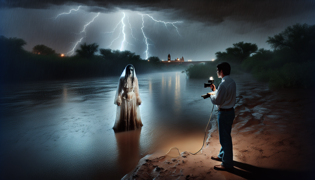La Yurona: The Wail That Rolls Across the Rio Grande
Reading Time: 13 min

About Story: La Yurona: The Wail That Rolls Across the Rio Grande is a Legend Stories from united-states set in the Contemporary Stories. This Descriptive Stories tale explores themes of Loss Stories and is suitable for Adults Stories. It offers Cultural Stories insights. A reporter digs into the border-town spectre who drowns the innocent and hunts faithless men.
Introduction
Camila Ortega felt the first omen when dust devils scattered across Highway 281 like startled phantoms, spinning grit that tasted of copper on her tongue. She was eight hours and a lifetime removed from Houston’s glass skyline, coasting into the borderlands where cicadas rattled louder than church bells and the scent of sun-struck creosote clung to every breath. The rental Jeep’s air-con whined, broadcasting the faint aroma of cracked vinyl and stale coffee ground into floor mats—a ghost of a road-trip diner two counties back. Ahead, Arroyo Oscuro shimmered in the desert heat, a cluster of tin roofs and limestone walls pressed against the Rio Grande’s snaking silver. Camila had sworn she’d never come home, yet a string of vanishings—two toddlers gone from a riverside quinceañera, a ranch hand found claw-marked and blue around the lips—dragged her south like a hooked catfish. Town gossips whispered La Yurona’s name between sips of hibiscus agua fresca, claiming the weeping woman was prowling again, hollow-eyed and hungry. Camila tightened her grip on the steering wheel, knuckles pale as bone china, and remembered abuela’s voice: “Stay clear of the water after sundown, m’ija; the river keeps receipts.” A tumbleweed thudded against the bumper, crumbling like old newsprint, and thunder rumbled beyond the distant Sierra Vieja, bringing the sharp ozone smell of a brewing storm. She reached for her battered recorder—one click, a whir, the comforting tick of magnetic tape—and drove on, unaware that by sunrise the river would trade another secret for a scream and leave her story soaked in grave-cold water.
Whispers Beneath the Mesquite
The next dawn cracked open like an overripe peach, spilling orange light across Arroyo Oscuro’s single main street. Camila stepped from her motel—a low cinder-block rectangle that smelled of bleach and mildew—into air already thick enough to drink. Sweat gathered at the crook of her elbows before she reached the gravel lot. A distant freight train moaned, its horn a rusty hinge in the sky, and the scent of diesel mixed with blooming huisache blossoms until her nostrils tingled.
El Gallo Rojo café sat beneath a corrugated awning painted the colour of dried sangre de toro wine. Ceiling fans inside spun lazy circles, chopping the aroma of cinnamon, piloncillo, and frying masa into welcoming layers. Delfina Salazar, all crow-black braids and gold Saint Benedict medallion, slid a clay mug across scarred Formica. “Folks say you’re fixin’ to poke the devil’s nest,” she muttered, steam curling around her words. The café’s walls—mint paint cracked like desert lakebeds—vibrated with quiet conversation: ranchers trading barbs, two Border Patrol agents nursing black coffee darker than midnight sin.

Camila flipped her notebook to a fresh page that smelled of printer toner and cedar shavings. Delfina spoke first of Arturo Velázquez, the mechanic whose laugh once rattled the walls like thunder in a silo. Arturo disappeared after a midnight catfish run, his skiff found drifting with only a half-chewed plug of tobacco and a slick of blood so thin it resembled spilt wine. “River liked him too much,” Delfina whispered, eyes reflecting fluorescent glare. An elderly vaquero chimed in: two teenage cousins, Mateo and Ignacio, ditched Sunday mass to swim under the full moon; search dogs later refused to approach the muddy bank, tails tucked and whining. Camila’s recorder caught every syllable, the tape spooling with a faint plastic-on-plastic hiss.
Mid-interview, the kitchen door slammed of its own accord—wood meeting jamb with the dull thud of a steer’s skull against fencing. Frying oil sizzled louder, carrying the acrid bite of burnt chile seeds. Delfina crossed herself. “When La Yurona’s near, doors talk,” she said, voice a cracked whisper. A farmer at the corner table spat tobacco into a Styrofoam cup and drawled, “Hell’s half-acre will freeze before I set foot by that river again. She’ll drag you quicker than a bar tab on payday, you hear?” The idiom fluttered in the humid room like a moth.
Outside, a dust-coated sheriff’s cruiser idled, air conditioner rattling. Deputy Raúl Cerda exited, boots scuffing gravel. His uniform smelled faintly of gun oil and menthol. He agreed to an on-record statement only if Camila killed the camera. Three bodies missing this quarter alone; all found skiffs empty, seat cushions clawed as if by desperate fingernails. He tapped the brim of his hat—sweat-salt white around the band—and muttered, “Some trails ain’t worth riding, señorita.” Camila noted his quiver; fear here was thick as mesquite sap.
By noon the café emptied. The heat hit a crescendo, and cicadas screeched until every wooden beam seemed to vibrate. Camila’s notes smelled of ink and tortilla grease. She stepped into sunlight so bright it flattened the world like a photograph left in a glovebox. Overhead, vultures spiralled lazy figure-eights, their shadows sliding across cracked pavement like dark thoughts. She realised each disappearance shared a common clock: between 11 p.m. and 3 a.m., when the river’s lullaby grew seductive. Somewhere in that stretch, La Yurona’s grief metastasised into hunger.
A sudden gust carried the tang of river mud up Main Street, damp and iron-rich, as though the Rio Grande had exhaled. The scent lingered in Camila’s hair while she drove to the sheriff’s office, adobe walls sweating in the heat. Inside, buzzing fluorescents flickered. Evidence boards showcased Polaroids: children’s sandals half-buried, a man’s bootprint ending at water’s edge, ripples frozen by flashbulb. Camila touched a thumb-smudged photo and felt, beneath its glossy surface, the faintest tremor—like a heartbeat trapped in celluloid.
Later, alone in her motel, she played the day’s tape. Between Delfina’s sentences a faint sobbing threaded itself, a sound she hadn’t heard live—a childlike whimper swimming beneath ambient café clatter. She cranked the volume; the lament sharpened until gooseflesh marched up her arms. It was the sound of someone mourning across a chasm, a note stretched thin as barbed wire in the wind.
Her bedside clock read 11:08 p.m. Somewhere outside, beyond the humming air unit, the night smelled suddenly of river reeds and decaying lilies. Camila closed the recorder, palms slick, and understood that the border between story and danger was narrowing, one heartbeat at a time.
Echoes of an Old Wound
Lightning spider-webbed the western horizon as Camila gunned her Jeep toward Rancho de la Luna, a Spanish-mission-era ruin eight kilometres upriver. The road dissolved into rutted caliche; each pothole jarred her spine and tossed the scent of rain-soaked dust into the cabin. Night birds shrieked under the live oaks, sounding like rusted hinges pleading for oil. When she finally cut the engine, silence spilled over her, dense and expectant, broken only by the distant churr of a nightjar.
The hacienda loomed, half-collapsed adobe walls glowing sickly in flash-photography bursts of lightning. Trumpet vines crawled across crumbling arches, their orange blossoms releasing a peppery perfume into the damp air. Inside, moonlight poured through a caved-in roof, pooling on cracked tile like spilled mercury. Her torch beam revealed a baptismal font veined with lichen and, above it, a mural half-erased by time: a woman in bridal white lifting two children toward a sun split by clouds. Paint flaked away in curls that smelled of chalk dust and centuries-old sorrow.

Local archives—dusty folios that left her nostrils itching—traced the story of Doña Soledad Zamora, 1871 heiress turned pariah. Betrayed by a married ranchero whose sweet-talk stunk of saloon whiskey, Soledad supposedly severed his carotid with a sewing shears, then drowned their children and herself in the river. Legends argued whether the Rio Grande accepted or rejected her corpse; newspapers from the Mexican side reported a body washed ashore, face twisted in a scream that curdled milk in nearby barns. Camila imagined the water that night: black velvet, cool as cellar tile, swallowing lantern reflections as easily as it swallowed breath.
She brushed a mural fragment; grit lodged under her nails, and a frigid pulse travelled up her wrist, as if the wall were breathing against her skin. Suddenly a hush fell—cicadas cut off mid-rasp, leaving the room hung with a vacuum. The faint smell of rosewater bloomed, incongruous as perfume in a crypt. Her torch flickered; in the strobing dark she glimpsed a figure—a bride drenched, lace clinging to skeletal shoulders—standing where moonlight met shadow. Camila stumbled back, boot scraping pottery shards. By the time she steadied the beam, the figure was gone.
Heart ticking like a wind-up alarm, she pressed record on her handheld. “If you’re here, Doña Soledad, I want to tell your story,” she whispered, voice trembling. Rain began, fat drops that smelled of tin and mesquite pollen. On the tape, only her breathing answered. Then, soft as a fingertip on wet glass: “¿Mis hijos?” The question rustled the rafters. A downdraft carried the stench of river mud and rotten lilies, and the mural wept a single bead of water down the painted mother’s cheek.
Camila fled into the storm. Outside, thunder clapped so close it slapped her eardrums. She yanked the Jeep door open; the seat leather felt slick, as if a wet body had just vacated it. Her reflection in the rear-view mirror looked like a stranger’s—eyes wide, hair pasted to temples. As she reversed, the hacienda’s ruined bell tower rang: one hollow toll, though the bronze bell had fallen decades earlier. She drove, tyres spitting mud, pulse so loud it overrode the ranchera song crackling from the radio.
Back in her motel at 3:12 a.m., she uploaded the audio. Spectrogram lines jittered red where frequencies peaked—there, the whispered hijos. She played it again; beneath the word she detected the faint plash of water closing over a small head, followed by distant sobbing. Exhaustion tugged at her, eyes gritty with sleepless sand, but a truth settled: La Yurona was no mere myth—she was a wound that never clotted, seeping loss into each generation. Camila scribbled in her notebook until dawn, ink smelling of steel and rain, the page filling with frantic connections: Zamora cousins, missing mechanics, drowned toddlers, all beads on the same bloody rosary.
Night of the Wailing Wind
Two evenings later the Rio Grande rose five feet in six hours, swollen by mountain runoff. Sheriff Cerda closed river access, but Arroyo Oscuro teens laughed in the face of caution—the river’s curve at El Codo was a rite of passage, after all. Camila parked on a shale bluff overlooking the bend, her parabolic mic wired to fresh batteries. The air pressed against her skin, humid as a laundromat, carrying the bitter tang of lightning strikes baking ozone above the chaparral.
At 9:17 p.m. a pickup’s tail-lights snaked down the dirt track: three boys and a giggling girl, all Spanish rock on the stereo, all bravado. They plunged into the shallows, splashing phosphorescent ripples that smelled of algae and churned clay. Camila’s recorder captured their whoops. Clouds banked overhead like cavalry; thunder growled basso profundo. Wind kicked up, flinging coarse river sand that pricked her cheeks. She pulled her jacket tighter, fabric smelling of dust and nervous sweat.

10:03 p.m. A lull. The girl—Isabel Rivas—rested on an inner tube, hair slick as raven feathers. Then it came: a cry slicing the dark, high and mournful, rising like steam from a cracked arroyo. “¿Dónde están mis hijos?” The phrase carried across water, threading through mesquite trunks. The teenagers froze, laughter dying quicker than a struck match in storm wind. Camila’s mic levels spiked blood red.
Lightning illuminated the river: at its centre, a woman draped in white lace, fabric plastered to her form like seaweed to driftwood. Her hair—water-dark, waist-long—floated around her, eyes twin pits of river-bottom silt. She lifted skeletal arms; water sheeted off, catching silver. The boys cursed, scrambling for the bank. Isabel screamed—a sound raw enough to skin hearts—and flailed. The apparition glided, not swam, closing distance with impossible grace.
Camila bolted downhill, boots sliding on loose shale. Every step released the sulphur smell of shattered stone. She shouted for the teens to grab the rope swing, voice hoarse. One boy slipped, knee slamming rock; his cry blended with the wailing wind, indistinguishable. Isabel’s tube flipped—splash, muffled gasp, then nothing but bubbles. Camila reached the bank; river water lapped cold around her calves, smelling of decaying lilies and diesel slick. She thrust a branch toward the flailing boy; fingers latched, knuckles white. The figure in lace hovered metres away, face twisted in grief, tears falling yet never diluting the river.
“¡Basta!” Camila yelled. The spectre’s head cocked—birdlike—and for an instant sorrow eclipsed hunger in those black eyes. Camila thrust her recorder forward as though it were a crucifix. “I’ll tell them,” she vowed, voice shaking like a rattler’s tail. “I’ll make them remember your name.” The weeping halted. Wind died. River stilled as if holding breath. The apparition’s dress bloomed like a white peony, and with a sigh that smelled of rain-muddied roses, she sank beneath the surface. Water closed, dimpling, then smoothing to glass.
Isabel resurfaced, coughing river grit, nails raking Camila’s arm. Sheriff Cerda’s spotlight swept over, diesel engine roaring. Teenagers dragged themselves ashore, skin mottled, lips shivering slate-blue. Above, thunder rolled away, sounding less like judgment and more like distant artillery finally wandering off the battlefield. Camila collapsed, jeans sodden and clinging, heartbeat ricocheting inside her ribs.
The sheriff insisted no statement mention ghosts—“Won’t have the Feds laughing us off the map, ya hear?”—but Camila’s tape had other plans. Back in her room, heater emitting burnt-dust scent, she reviewed the audio: teen screams, thunder, and beneath that, a woman humming a lullaby. Spanish lyrics flowed soft as river silt: sleep, child, sleep; mother’s here, mother’s near. The song ended in a sob sharp enough to cut glass, then—silence.
Camila wrote through sunrise, laptop keys clacking like distant castanets. She braided archive facts, modern tragedy, and the river’s incessant memory into a narrative that pulsed with saltwater grief. Each sentence tasted of metal on her tongue, yet she pressed on, knowing some stories must be told even if they splinter the teller in the telling.
Conclusion
When the floodwaters retreated two days later, they left behind cattail stalks bent like penitents and a riverbank patterned with tiny barefoot impressions that halted at the waterline. No bodies surfaced, though rumours claimed a cloth scrap—white lace, slick with algae—snagged on a willow root before dissolving like sugar. Camila filed her story; regional papers ran it under the headline: WEAPING WOMAN OR WATERY CURSE? Reaction split faster than a mesquite fence in August heat. Skeptics mocked ‘county-line superstition’; grieving mothers pressed scapulars to the page, murmuring prayers. Sheriff Cerda closed El Codo indefinitely, yet restless youth still dared the currents under moon’s thin grin. Camila remained a fortnight, track-shoes crunching dry river silt each sunset. Some nights a faint sob drifted across the reeds, mingling with coyote yips; other times only the slow heartbeat of the water answered. Before she left, Delfina gifted her a jar of café de olla spice mix—anise, piloncillo, cinnamon—to ‘keep the cold out’. The aroma followed Camila up Interstate 35, a reminder that stories, like rivers, refuse tidy endings. In Austin she replayed the lullaby for a sound engineer; he isolated undertones: infant splashes, a heartbeat, a whisper: “Nunca me olvides.” Never forget me. The engineer laughed it off, but Camila felt her chest tighten, sure as sunrise that the river remembers every sin. And when humid nights settle over any city she inhabits, she sometimes catches a chill, hears distant weeping riding a southern wind, and knows La Yurona still walks the water, grieving, hunting, reminding the living that love and loss share the same dark current.

















